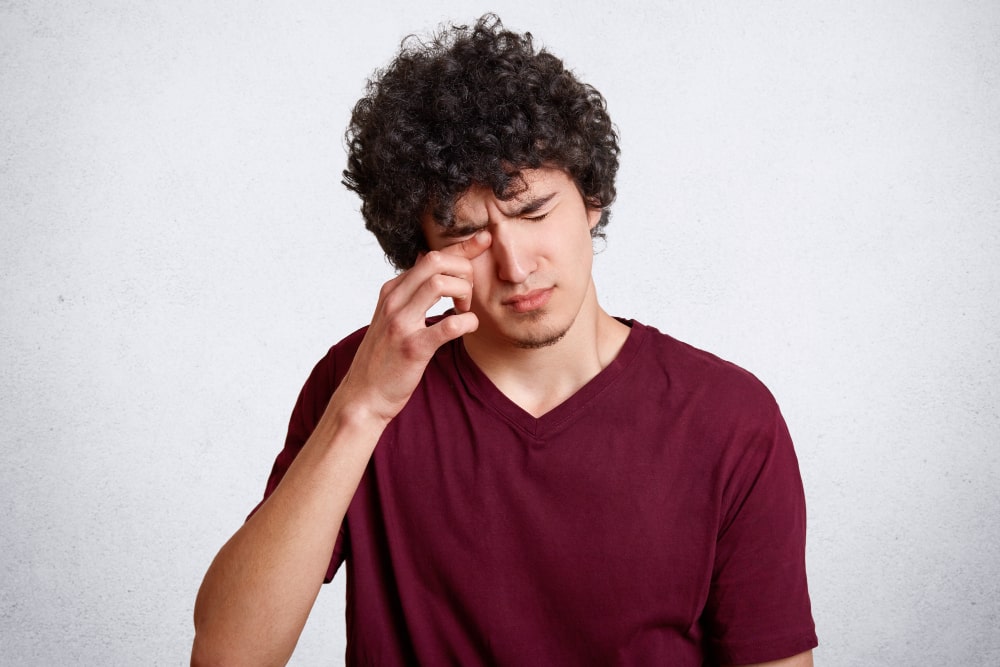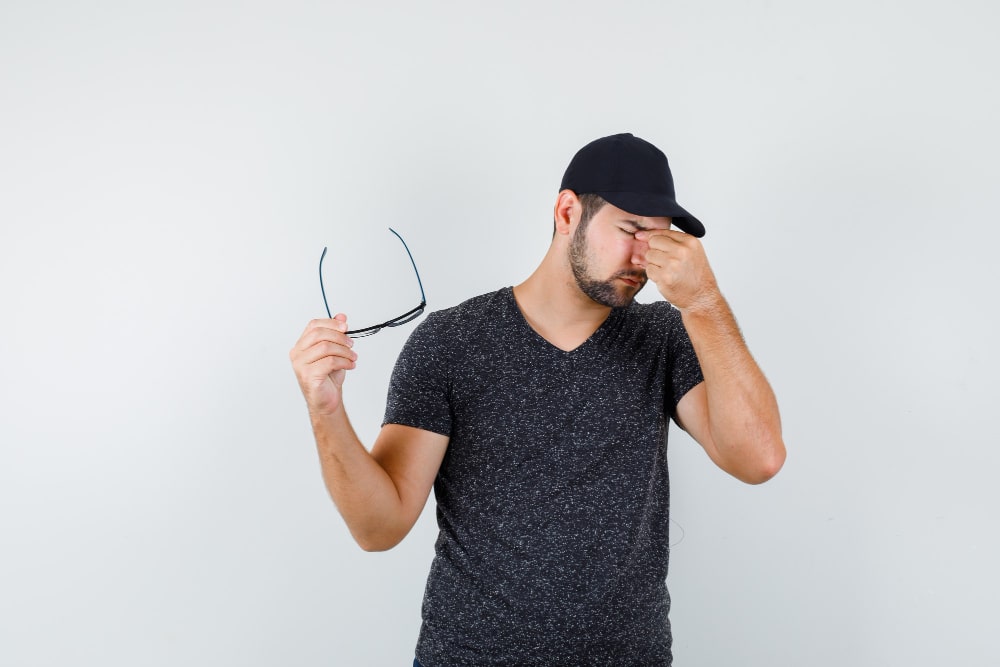Sudden sharp stabbing pain in eye can be frightening and disorienting. It can range from mild discomfort to intense pressure or the sensation of being pricked with a needle. The most common causes are corneal abrasions, conjunctivitis (pink eye), ocular migraines, dry eye syndrome, and acute glaucoma. Early diagnosis and treatment are essential for this condition as some of these conditions require immediate medical attention. This article will provide an overview of the symptoms, causes, diagnosis & treatments, prevention tips and when to seek medical help for sudden sharp stabbing pain in eye.
1. Introduction:
Sudden sharp stabbing pain in eye is an abrupt and intense sensation of pain that can be localized to one or both eyes. It’s important to seek medical attention immediately if you experience this pain, as it could indicate a serious underlying condition. The most common causes for sudden sharp stabbing eye ache include corneal abrasions, conjunctivitis (pink eye), ocular migraines, dry eye syndrome, and acute glaucoma. These conditions may involve different symptoms and treatment approaches.
2. Symptoms of Sudden Sharp Stabbing Pain in Eye:
The most distinctive symptom of sudden sharp stabbing pain in eye is a feeling of intense pressure or piercing sensation. This pain can be localized to one or both eyes and may last a few seconds or several minutes. Other symptoms accompanying this condition include redness, swelling, sensitivity to light, and difficulty moving the affected eye.
3. Causes of Sudden Sharp Stabbing Pain in Eye:
Corneal Abrasion or Foreign Body
Corneal abrasions are scratches on the surface of your cornea that can cause sudden sharp stabbing eye ache. These types of injuries are usually caused by physical contact with a foreign object, such as dirt or dust particles, eyelashes, fingernails, etc., which can scratch the cornea and trigger an acute response from your body’s immune system. Symptoms of corneal abrasion may include excessive tearing, sensitivity to light, and blurry vision. Treatment options for corneal abrasion or foreign body may involve:
- Using eye drops.
- Wearing an eye shield at night.
- Avoiding contact lenses until the abrasion has healed.
Read More: Pain Behind Knee Hamstring: Causes, Symptoms, Treatment
Conjunctivitis
Conjunctivitis (also known as pink eye) is an inflammation of the outer layer of your eyeball that can cause sudden sharp, stabbing pain in the affected eye. The signs and symptoms associated with conjunctivitis can include:
- Redness or swelling of the eyes.
- Itching or burning sensation.
- Discharge from the eyes.
- Crusting around eyelids.
- Blurred vision.
- Sensitivity to light.
Treatment options for this condition may involve eye drops, antibiotic ointment, and warm compresses.
Ocular Migraines
Ocular migraines are a type of migraine headache that can cause sudden sharp stabbing ache in eye. Signs and symptoms associated with this condition may include vision loss or distortion, light flashes, scotomata (blind spots), and blurred vision. Treatments for ocular migraines typically involve medications to reduce inflammation and relieve pain. Additionally, lifestyle modifications such as avoiding certain triggers like caffeine or alcohol can help manage your symptoms.
Dry Eye Syndrome
Dry eye syndrome is common in which your eyes don’t produce enough tears to keep them lubricated. This can cause sudden sharp stabbing ache in eye, redness, irritation, and a gritty feeling due to dryness. Treatment options for dry eye syndrome may involve:
- Using artificial tear drops or ointments.
- Taking omega-3 supplements.
- Avoiding certain medications that can worsen dryness.
Read More: Sharp Pain in Ear: Causes, Symptoms, Treatments, Prevention
Acute Glaucoma
Acute glaucoma is an eye condition caused by increased intraocular pressure, leading to sudden sharp stabbing pain in eye. Other signs and symptoms associated with acute glaucoma may include vision loss or distortion, halo vision (seeing rings around lights), nausea and vomiting, headache, and blurred vision. It’s important to seek immediate medical attention if you experience any of these symptoms, as it can lead to permanent vision loss. Treatment options for this condition may involve using eye drops or medications to reduce intraocular pressure, and in some cases, surgery may be necessary.


4. Diagnosis & Treatment:
Diagnosing sudden sharp stabbing pain in eye can typically be made through a comprehensive physical examination and tests, including imaging tests such as CT scans and MRIs. Treatments may vary depending on the underlying cause, from medications and eye drops to lifestyle modifications or even surgery.
Medications used to treat sudden sharp stabbing ache in eye include steroids, anti-inflammatory drugs, antibiotics, and antifungal drugs that can help reduce inflammation and pain. Additionally, eye drops such as artificial tears or lubricating drops can replace missing tears and help alleviate symptoms. Warm compresses can also provide relief from discomfort caused by dryness or inflammation.
In some cases, surgery may be necessary to repair the damage caused by corneal abrasions or to remove debris from the eyes that could irritate. Surgery for acute glaucoma may involve laser treatments or a trabeculectomy, which involves creating a new drainage system in your eye to reduce intraocular pressure.
It’s important to follow your doctor’s instructions carefully when treating sudden sharp stabbing ache in eye, including medications, eye drops, and lifestyle changes. Doing so will help ensure you experience relief from your symptoms and prevent further damage to your eyes.
Read More: Back Pain When Coughing: Causes, Symptoms, Treatment
5. Prevention of Sudden Sharp Stabbing Pain in Eye:
Protecting your eyes from potential sources of injury is one of the best ways to prevent sudden sharp, stabbing pain in eye. Here are some tips to help you reduce your risk:
- Wear protective eyewear when participating in sports or recreational activities;
- Avoid rubbing your eyes with unwashed hands;
- Be careful when using contact lenses, and only use them if recommended by an optometrist;
- Refrain from wearing eye makeup that contains allergens;
- Use artificial tears and lubricating drops regularly to keep your eyes hydrated; and
- Visit an optometrist for regular checkups and vision tests.
By following these simple tips, you can help reduce your risk of experiencing sudden sharp stabbing ache in eye.
6. When to Seek Medical Help
If you experience sudden sharp stabbing pain in your eye, it’s important to seek medical attention immediately. This type of eye pain can be caused by many conditions and, if left untreated, can lead to permanent vision loss or damage. Your doctor can diagnose the underlying cause of your symptoms and recommend a treatment plan that is best for you. In some cases, an emergency room visit may be necessary, depending on the severity of your condition.
Conclusion
In conclusion, sudden sharp stabbing pain in eye can be caused by many conditions and should be examined by a doctor as soon as possible. Treatment options may include medications, eye drops, artificial tears, warm compresses, or even surgery, depending on the underlying cause. Additionally, individuals can help reduce their risk of this type of eye pain by taking precautions such as wearing protective eyewear and avoiding contact lenses and allergens that could worsen symptoms. By knowing the signs and symptoms associated with a sudden sharp stabbing ache in eye and seeking prompt medical attention when needed, you can help ensure that your vision remains clear and healthy.
Read More: Tailbone Pain During Pregnancy: Causes, Treatment
FAQs
A: Symptoms associated with this condition may include vision loss or distortion, light flashes, scotomata (blind spots), blurred vision, redness, irritation, and a gritty feeling due to dryness.
A: Diagnosis of this condition typically involves a comprehensive physical examination and imaging tests such as CT scans and MRIs. Your doctor may also consider your medical history to determine the underlying cause.
A: Treatment options may vary depending on the underlying cause but may include medications and eye drops to reduce inflammation or dryness, artificial tears, warm compresses, lifestyle modifications or even surgery.
A: The best way to prevent this type of eye pain is by taking precautions such as wearing protective eyewear when participating in sports or recreational activities, avoiding contact lenses and allergens that could worsen symptoms, using artificial tears and lubricating drops regularly to keep your eyes hydrated, and visiting an optometrist for regular checkups and vision tests.
A: If you experience sudden sharp stabbing ache in your eye, you must immediately seek medical attention. Doing so will help ensure that your vision remains clear and healthy and prevent further damage to your eyes.
A: If left untreated, this type of eye pain can lead to permanent vision loss or damage. Therefore, it’s important to seek prompt medical attention when experiencing these symptoms.

